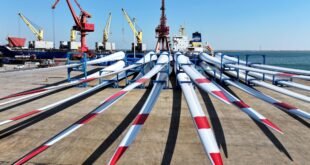Dangote Oil Refinery Shifts Focus to Local Crude Supply
The Dangote oil refinery is set to receive 10 shipments of crude oil from the Nigerian National Petroleum Company Limited (NNPC) between July and August, according to a report. This development marks a significant step in the facility’s plan to phase out crude imports by December 2025.
The refinery aims to fully rely on locally sourced crude by the end of the year, which would replace hundreds of thousands of barrels of imported oil daily. In July, the facility was scheduled to take five cargoes from NNPC, with an identical number expected in August, as revealed by a list of cargo allocations seen by Bloomberg News.
Each shipment reportedly contains nearly one million barrels of crude, meaning that around 10 million barrels will be supplied by NNPC during this period. The refinery received approximately half of its crude supply in June from local producers, who are expected to increase their exports to the facility as their foreign supply obligations come to an end.
Devakumar Edwin, Vice President at Dangote Industries and overseeing the 650,000 barrel-a-day plant in Lagos, stated that the refinery will source its feedstock locally once oil producers’ contracts with foreign traders expire. He added, “We expect some of the long-term contracts will expire. Personally, and as a company, we expect that before the end of the year, we can transition 100 per cent to local crude.”
Despite this shift, the founder of the refinery, Aliko Dangote, recently acknowledged that the facility still relied heavily on the United States for crude supply, even though there is a naira-for-crude deal in place. The Nigerian Upstream Petroleum Regulatory Commission highlighted in its 2024 report that oil producers had protested against the directive to supply crude to Dangote and other local refineries under the Domestic Crude Supply Obligations.
Challenges such as supply contracts with foreign companies, crude theft, and attacks on pipelines in the Niger Delta have affected production and reduced the availability of oil for the local market. However, Edwin noted that the company has imported crude from Brazil, Angola, Ghana, and Equatorial Guinea. He emphasized that improved relations between the refinery, local oil traders, and the government will lead to a steady supply of Nigerian crude.
The facility is expecting a significant increase in local oil over the coming months. Data from Bloomberg showed that in June, the refinery sourced 53% of its crude supply from domestic producers and 47% from the United States. Currently, the plant is processing 550,000 barrels of crude per day.
Aliko Dangote built his $20 billion refinery with the goal of preventing Nigeria’s crude from being sent to Europe for refining and then re-imported as costly products. The gradual expansion of the refinery is already positioning Nigeria as a net exporter of petroleum products, despite challenges in securing crude to reach its 650,000 bpd nameplate capacity. Initially, the effort required large quantities of overseas crude due to domestic traders failing to meet demand.
 Info Malang Raya Its All About World News
Info Malang Raya Its All About World News




